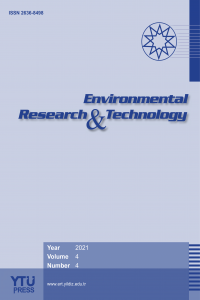Abstract
References
- Chauhan, D.S. (1952), “Agricultural Economics”. Agra India: Lakshmi Narain Agarwal Educational Publishers: 354
- Kılavuz, E., & Erdem, İ. (2019). Agriculture 4.0 Applications in the World and Transformation of Turkish Agriculture. Social Sciences, 14(4), 133-157
- Sami Doğan, Presentation of The Importance of Agriculture for Turkey, 2018
- Glossary of Environment Statistics, Studies in Methods, Series F, No. 67, United Nations, New York, 1997
- TUIK, Address Based Population Registration System Results, 2019
- Malinauskaite, J., Jouhara, H., Czajczyńska, D., Stanchev, P., Katsou, E., Rostkowski, P., ... & Anguilano, L. (2017) Municipal solid waste management and waste-to-energy in the context of a circular economy and energy recycling in Europe. Energy, 141, 2013-2044
- Republic of Turkey Ministry of Environment and Urbanization, Agriculture Symposium Handbook, 2017
- ÇOBAN, O., & KILINÇ, N. Ş. (2016). Investigation of Energy Use of Environmental Impact. Marmara Coğrafya Journal, (33), 589-606
- World Wide Fund for Nature (WWF), Energy Report, 2011
- D'Amato, D., Veijonaho, S., & Toppinen, A. (2020). Towards sustainability? Forest-based circular bioeconomy business models in Finnish SMEs. Forest policy and economics, 110, 101848
- United Nations Environment Programme (UNEP), Bloomberg New Energy Finance Report, 2012
- Javad Asgari, M., Safavi, K., & Mortazaeinezahad, F. (2011). Landfill biogas production process. In International Conference on Food Engineering and Biotechnology IPCBEE IACSIT Press, Singapoore (Vol. 9)
- Van Lier, J. B., Mahmoud, N., & Zeeman, G. (2008). Anaerobic wastewater treatment. Biological wastewater treatment: principles, modelling and design, 415-456
- Wilkie, A. C. (2005). Anaerobic digestion: biology and benefits. Dairy manure management: treatment, handling, and community relations, 63-72
- http://www.celignis.com/anaerobic-digestion.php, Celignis Analytical Website. [Online]. Available: (2021).
- The Ministry of Agriculture and Forestry, Fertilizer Sector Policy Document 2018-2022, TAGEM R&D and Innovation, Ankara, 2018
- www.tarimorman.gov.tr/Konular/Bitkisel-Uretim/Bitki-Besleme-ve-Tarimsal-Teknolojiler/Bitki-Besleme-Istatistikleri?Ziyaretci=Ihracat-Ithalat, The Ministry of Agriculture and Forest of Republic of Turkey Website. [Online]. Available: (2021).
- https://bepa.enerji.gov.tr/, Atlas of Biomass Energy Potential Website. [Online]. Available: (2020).
The agricultural waste inventory on the regional basis in Turkey: Valuation of agricultural waste with zero-waste concept in the scope of circular economy
Abstract
Turkey is an agricultural country. Agriculture has an important share among our livelihoods in Turkey. Apart from the parts that are used as a result of agricultural activities, which have direct economic value and are sent to various industries for processing, there are also non-consumption or unused parts of the agricultural products. Therefore, agricultural activities bring a large amount of agricultural waste with them. However, as long as agricultural wastes are not valued, they can be considered as a significant economic loss. Similar to the increase in world population, the population of Turkey increases rapidly. Of course, this growth in the population brings energy needs with it. However, environmental damage caused by greenhouse gas emissions released into the atmosphere due to the use of fossil resources and reserve shortage leads us to look for renewable energy sources. Therefore, biogas production from organic wastes as a sustainable approach allows agricultural wastes formed in high quantities in Turkey, problematic for farmers for different ways and seen as an economic loss to be converted into energy forms.
In the study, biogas production was supported by the anaerobic digestion system method in order to convert various agricultural wastes in the different regions of Turkey into an energy form. While producing energy from biogas, digestate can be re-fed to agricultural lands as fertilizer. In this study, agricultural waste inventory has been created for seven different regions and suggestions for future have been given.
References
- Chauhan, D.S. (1952), “Agricultural Economics”. Agra India: Lakshmi Narain Agarwal Educational Publishers: 354
- Kılavuz, E., & Erdem, İ. (2019). Agriculture 4.0 Applications in the World and Transformation of Turkish Agriculture. Social Sciences, 14(4), 133-157
- Sami Doğan, Presentation of The Importance of Agriculture for Turkey, 2018
- Glossary of Environment Statistics, Studies in Methods, Series F, No. 67, United Nations, New York, 1997
- TUIK, Address Based Population Registration System Results, 2019
- Malinauskaite, J., Jouhara, H., Czajczyńska, D., Stanchev, P., Katsou, E., Rostkowski, P., ... & Anguilano, L. (2017) Municipal solid waste management and waste-to-energy in the context of a circular economy and energy recycling in Europe. Energy, 141, 2013-2044
- Republic of Turkey Ministry of Environment and Urbanization, Agriculture Symposium Handbook, 2017
- ÇOBAN, O., & KILINÇ, N. Ş. (2016). Investigation of Energy Use of Environmental Impact. Marmara Coğrafya Journal, (33), 589-606
- World Wide Fund for Nature (WWF), Energy Report, 2011
- D'Amato, D., Veijonaho, S., & Toppinen, A. (2020). Towards sustainability? Forest-based circular bioeconomy business models in Finnish SMEs. Forest policy and economics, 110, 101848
- United Nations Environment Programme (UNEP), Bloomberg New Energy Finance Report, 2012
- Javad Asgari, M., Safavi, K., & Mortazaeinezahad, F. (2011). Landfill biogas production process. In International Conference on Food Engineering and Biotechnology IPCBEE IACSIT Press, Singapoore (Vol. 9)
- Van Lier, J. B., Mahmoud, N., & Zeeman, G. (2008). Anaerobic wastewater treatment. Biological wastewater treatment: principles, modelling and design, 415-456
- Wilkie, A. C. (2005). Anaerobic digestion: biology and benefits. Dairy manure management: treatment, handling, and community relations, 63-72
- http://www.celignis.com/anaerobic-digestion.php, Celignis Analytical Website. [Online]. Available: (2021).
- The Ministry of Agriculture and Forestry, Fertilizer Sector Policy Document 2018-2022, TAGEM R&D and Innovation, Ankara, 2018
- www.tarimorman.gov.tr/Konular/Bitkisel-Uretim/Bitki-Besleme-ve-Tarimsal-Teknolojiler/Bitki-Besleme-Istatistikleri?Ziyaretci=Ihracat-Ithalat, The Ministry of Agriculture and Forest of Republic of Turkey Website. [Online]. Available: (2021).
- https://bepa.enerji.gov.tr/, Atlas of Biomass Energy Potential Website. [Online]. Available: (2020).
Details
| Primary Language | English |
|---|---|
| Subjects | Environmental Engineering |
| Journal Section | Conference Paper |
| Authors | |
| Early Pub Date | December 31, 2021 |
| Publication Date | December 31, 2021 |
| Submission Date | January 11, 2021 |
| Acceptance Date | November 30, 2021 |
| Published in Issue | Year 2021 Volume: 4 Issue: 4 |

